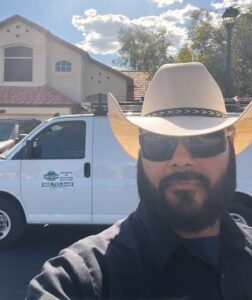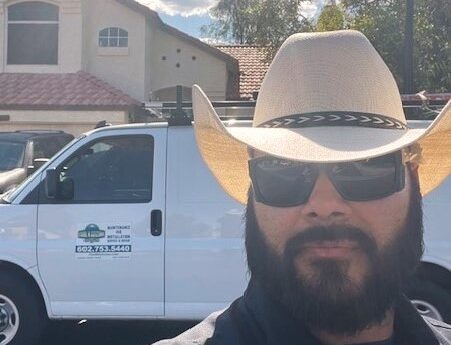RSI is a Great Training Option for Everyone
Learn more about how we can prepare you to advance your career.
Sal, 38, from San Marcos, California, completed the nine-month Electro-Mechanical Technologies (EMT) program at RSI in January 2016.
Thanks for your time, Sal; what did you do before coming to RSI almost 10 years ago? 
My father was always a mechanically inclined person; he was a diesel mechanic, so I did that with him growing up. After high school, I went into the United States Marine Corps and served for five years. I followed my father’s profession and worked as a diesel mechanic in the military. I only got to do that for maybe a year after my year of training before they moved me up into a supervisory position. I looked over the equipment I used to work on. I did that for the remainder of my enlistment in South Carolina.
Thank you for your service. What did you do after you left the military?
When I got out, I moved to Arizona and went to UTI in Avondale to do an Automotive Diesel and Industrial program. I was there for three years and completed it, but everything was changing so fast that by the time I was done, I needed to learn more. School just got so expensive; I was looking at over six figures just to keep up with the trade. I was working at an oil lube shop, like a Jiffy Lube kind of place while I went to school.
Get Started on the Path to a New Career
Fill out our form to learn how we can help you change your life.
Wow! That’s a lot to keep up with the skills. So where did the idea of RSI come from?
I started the freight line classes, but I ended up stopping. There was a big gap, so that’s what stopped me from following the profession into the 18-wheeler side of it. I got discouraged; I wanted something different and honestly, I’d got bored of that stuff. I decided to change trades and transitioned to RSI.
Why did you choose the EMT program at RSI?
The way I stumbled into RSI and HVAC was through one of my good friends, Jay. We got talking about solar and up-and-coming technology, and wouldn’t it be great to get into solar as we’re in Arizona. So, after a good few months of talking about it, we saw there was an Open House at RSI. Jay asked me, “Do you want to go, get some free food, and see what happens?” I thought, “Sure, why not?” We ate some hot dogs and spoke to everybody. I had a great time talking to the instructors; they were very personable, it just felt like I was talking to a friend in class, so I asked, “Hey, what are the options for veterans?” From there we looked into the GI Bill, and I literally signed up the same day. As a veteran, it was easy, simple.
Did your buddy Jay sign up too?
He did, but he isn’t a veteran, so it wasn’t as easy. He had to figure out financing, but the school helped him with all that. He started when the next class came up; I want to say Jay was about a month behind me.
What did you enjoy most about your time at RSI?
There was a lot of hands-on time. Even on day one, they let you walk around all the classrooms so you have free range and can look at everything, which I liked. You got a tour of the whole place. In the first phase, they had a wall that showed all the devices we were going to learn about; you have no idea what they are. Then you go through the classes and start learning, and you connect the dots. The instructors seemed very passionate about what they do; they were very eager to help and nurture the next generation of techs. Some of the instructors even give us their numbers in case we have questions in the future. It was a great way of saying, “Hey, you’re not alone, and even when we send you out there, you’re still not alone.”
Did you have any prior experience in electrical or HVAC work?
I dabbled in electrical with my father and in the military. He had to be a basic electrician as far as automotive goes, and then all the cars had air conditioning. So, I knew the principles of how it all works, and it seemed to be very similar, just on a different scale. One thing that stood out both in my military training and at UTI was that I excelled in HVAC. The biggest difference between automotive and residential electrical is that the colors are different. The terminology is also different, but it uses the same principles. So, my biggest struggle was staying away from my old verbiage. Everything for me was about understanding more. I knew I could make things work, but I didn’t know why. RSI gave me more of that deeper knowledge about the ‘why’.
You graduated in January 2016. Tell us about your career since. How did you get started?
A week before graduation, they had a job fair at the school. Like most students, I struggled financially but I had $20, and I wanted to make it count. So I went to a Goodwill, got a nice button up shirt and a pair of dress pants and a belt. I put that all together and showed up at the job fair with my résumé in hand that the RSI Career Services team had helped me build. They looked over my automotive résumé, updated it and made it look a lot nicer for the field I was applying for. They made it look really good, honestly.
The résumé and clothes were a good idea. First impressions count. Was the job fair busy?
They had people upstairs and downstairs, everyone was everywhere. I walked through the whole place, said hello to everyone, shook everyone’s hand. I applied to the places that I liked. It was a completely different world from before. I was in the spotlight, I was wanted. People saw that I was a veteran, that I had good grades, and I was on top of it at school. People told me that I was number one on their list. It was definitely a 180 change from what I’d been experiencing since I got out of military, which was rejection.
So, who did you end up choosing?
I went with Parker & Sons. I had three companies after me. I think it was George Brazil, Parker & Sons…I can’t remember the last one. The day of our graduation, I was already in an attic working. I didn’t waste any time. I needed to get on my feet as soon as possible. As much as I loved my classmates, I needed to get to it.
Briefly, what did you do from there?
I stayed with Parker & Sons for about two/three years, they have great training, and then I moved to Lake Havasu to work for a mom-and-pop shop with five employees. That was a different world from the sales focus of Parkers. In Havasu, they wanted a technician, not a salesman, and that suited me more. In the military, you’re not trained to sell, you’re trained to get the job done. In Havasu, it was a lot of home warranty work, which is quick work, just fix it and get out. With a small company, you also become a jack-of-all-trades; you don’t have an install or a maintenance team, you just do it all. I learned a lot out there in two or three years.
Let’s skip forward to today.
My partner and I – the friend I went to school with – have our own company called Cool N Arizona. We’ve been in business for three years. In January we’re adding plumbing, we’ve taken on a new business partner who has expertise in the plumbing field, and we’re changing the name to HQ Plumbing and Air.
Congratulations! What’s the plan from here then Sal?
Obviously, the end goal is what keeps me going, which is retirement. We’re trying to build something amazing so we can sell it one day and retire and enjoy time with family. I’d like to do that while I can still move around! Our goal is to get a crew of five on the plumbing side and five on the HVAC side. That would get us to the numbers that we want to see in the next three to five years. That would allow us, as owners, to put down the tools and work on the business, rather than in the business.
Sounds like choosing RSI was the right decision for you ten years ago?
Yes, RSI was definitely the right decision for me. I have always been a tinkerer; I like to take things apart and put them together again, make things work. So, for me, it was definitely worth the investment as far as the time I put in. Had I paid for it myself, I would have certainly paid even more attention than I did!
What do you enjoy most about this trade?
I live in Arizona where A/C is a necessity, not a luxury. Going into peoples’ homes makes me feel like I have a purpose, I’m helping people. When I got out of the Marine Corps, I felt like I’d lost my purpose, but now I have it back. The sense of accomplishment of helping people out, especially when it involves kids, the elderly, or those with health issues who can’t leave their homes. That’s a big thing for me. I get the most joy out of helping them and being able to say, “I did something good”. There’s been a few times where I’ve come across situations where I put money to the side. “I’m not here to make money today. I’m just going to help you.”
What advice do you have for new students to be successful at RSI?
The first day of school, or at least within the first week, introduce yourself to your class. Get that out of the way, that way there are no strangers. You’re all classmates and it’s going to feel that way. On day one in the classroom, I sat in front of the whole class and introduced myself, “Hey, my name’s Sal, I’m a veteran. I did five years in the Marine Corps as a diesel mechanic, and so on and so forth…” You are going to be there day in and day out for nine months, so there’s no point being shy around each other. Get comfortable. I even created an RSI Study Group page on Facebook as a resource to help everyone out. It made us more connected.
The other thing is don’t be afraid to ask questions; the only dumb question is a question not asked. Many times, I’d ask questions for someone who was scared to ask and it’s okay. Make sure you raise your hand, ask the question, and slow the instructor down. They are there to help you, teach you, not to belittle you.
And then of course, if you’re paying for it, pay attention!
If you’re an RSI graduate and would like to share your success and be an inspiration to others, please email [email protected] to be considered for a Graduate Connection interview. Please include details such as your graduation date (month/year) and program.




